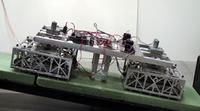-
Industry: current chemical safety standards sufficient, should be extended
DHS’s management of the U.S. chemical plant safety has come under criticism lately, but he Society of Chemical Manufactures and Affiliates (SOCMA) said it strongly supports U.S. chemical security standards; the industry associated noted that since the program’s 2007 launch, more than 2,000 facilities have changed processes or inventories such that they are no longer considered high-risk under the Chemical Facility Anti-Terrorism Standards (CFATS)
-
-
Critics: current chemical safety standards insufficient, should not be extended
Critics of the current chemical plant safety standards say these standard are insufficient and should be extended; critics cite EPA data to highlight the fact that current safety standards leave more than 110 million Americans at risk from high-risk chemical plants
-
-
Better to use spray rather than a gun in bear encounters
Carrying a gun in bear country does not mean you are more protected in the event of a bear encounter; researchers say people should behave cautiously and carry bear spray instead
-
-
Growing use of IEDs by anti-government insurgents in Syria
The monthly number of IEDs reported in Syria jumped 134 percent from December to January; analysts say this is an indication of foreign involvement with the rebels
-
-
FCC explores grating local police authority to shut off mobile networks
The U.S. Federal Communications Commission (FCC) is currently seekingpublic comment on whether it is appropriate for law enforcement agencies to shut down cell phone networks
-
-
The Bruzer – a less lethal, compact 12-gauge
To augment local police officers’ growing array of non-lethal weapons, Tommy Teach, a military combat veteran, has designed a compact non-lethal 12-guage shotgun
-
-
LoJack helps recover more than 10,000 stolen cars
On Tuesday LoJack Corporation, the manufacturers of the eponymous vehicle tracking device, released their latest statistics on vehicle theft
-
-
Company develops telephone line “fingerprint” detector
Researchers at Pindrop, a new security company, have developed technology that can read telephone line “fingerprints” to prevent fraud and identify a caller
-
-
Infant survivor of Indiana tornadoes dies, death toll rises to 39
The fifteen-month old infant survivor of the twisters that struck Kentucky and Indiana, who had come to represent a symbol of hope, has died; the death toll is now thirty-nine
-
-
Pasta-shaped radio waves beamed across Venice
One solution to communication congestion during emergencies is to create a public safety-dedicated band of the spectrum, allowing for a unified and uninterrupted communication among first responders; another solution is twisting radio waves into the shape of fusilli pasta, allowing a potentially infinite number of channels to be broadcast and received
-
-
MIT, DARPA developing self-healing cloud network
Researchers at the Massachusetts Institute of Technology (MIT) and the Pentagon’s advanced research arm DARPA are working together to create a self-healing cloud computing network that can defend against cyberattacks
-
-
DARPA holds $40,000 competition to test social media in disasters
To better understand how emergency responders can leverage social media tools, the Defense Advanced Research Projects Agency (DARPA) is holding the$40,000 CLIQR Quest Challenge
-
-
Anonymous retaliates, takes down Interpol site

In retaliation for the arrest of twenty-five suspected members of the hacktivist collective known as Anonymous, the group briefly took down Interpol’s website on Tuesday
-
-
FBI increasingly concerned with “sovereign citizen” movement

Over the past decade, the FBI has grown increasingly concerned with the “sovereign citizen” movement; since 2000, sovereign citizens have killed six police officers and violent battles with law enforcement agents are on the rise; the U.S. National Counterterrorism Center classified the movement as a major threat alongside Islamic extremism
-
-
Snake-emulating search-and-rescue robot

An all-terrain robot for search-and-rescue missions must be flexible enough to move over uneven surfaces, yet not so big that it is restricted from tight spaces; it might also be required to climb slopes of varying inclines; researchers say the solution would be a search-and-rescue robot which emulates the locomotion of a certain type of flexible, efficient animals: snakes
-
More headlines
The long view
Why Ukraine’s AI Drones Aren’t a Breakthrough Yet
Machine vision, a form of AI, allows drones to identify and strike targets autonomously. The drones can’t be jammed, and they don’t need continuous monitoring by operators. Despite early hopes, the technology has not yet become a game-changing feature of Ukraine’s battlefield drones. But its time will come.
